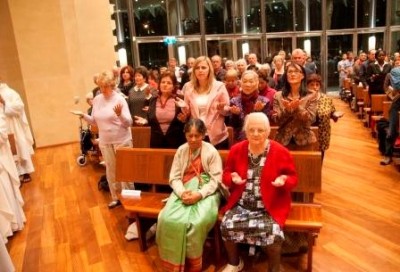Go and Rebuild My Church
Two hundred and forty (240) priests joined Archbishop Timothy Costelloe SDB in St Mary's Cathedral on Tuesday evening 26 March to celebrate the Chrism Mass and to recommit themselves to serving the People of God in the Archdiocese of Perth.
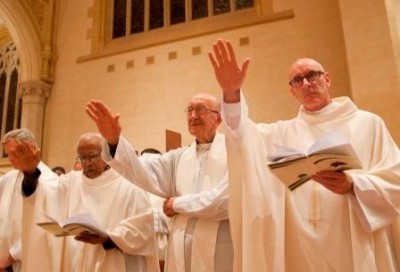
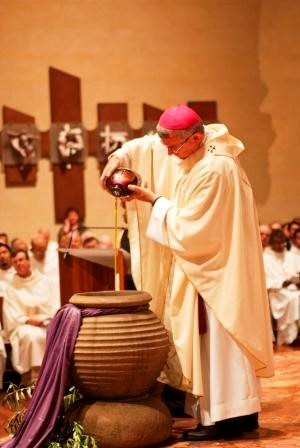
Archbishop Costelloe reflected in his homily on the recent election of Pope Francis and the call of Chirst to the Pope's patronal namesake, St Francis of Assisi: "Go and rebuild my Church, for it is falling into ruins."
In doing this, the Archbishop said we need to be like St Peter who, when beginning to sink in the stormy seas, heard the uplifting words of Christ, "Be not afraid, I am with you."
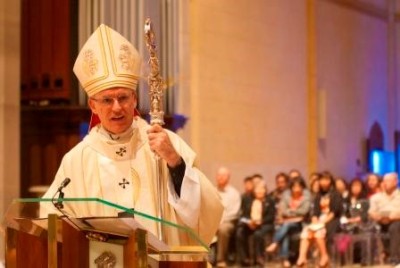
Chrism Mass Homily
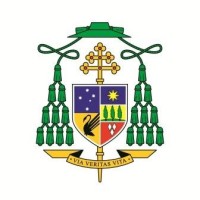
Archbishop Timothy Costelloe SDB
In the year 1207, in a little rundown and crumbling church in the countryside not far from a market town in central Italy, a young man of twenty-six knelt down in prayer. He had been a soldier and came from a rich merchant family, but having returned from the war and from imprisonment sick and dispirited, he had experienced a profound conversion of heart and now preferred to wander the hills and valleys alone, reflecting on and praying about his future. The young man's name was Francis, the little church was the Church of San Damiano, and the nearby town was called Assisi. It is this young man, St Francis of Assisi, whose name our new pope bears. It seems opportune then for us to ask ourselves this evening what St Francis, and Pope Francis, might be able to teach us as we celebrate this Chrism Mass together.
As the young Francis knelt in that church, looking up at the crucifix with its lamp burning before it, he seemed to hear the Lord speaking to him from the cross. "Go and rebuild my Church, for it is falling into ruins." Francis was a simple young man. As he looked around him at the ruined church in which he found himself, he decided that the Lord was calling him to repair the building which he immediately set out to do. Years later, long after he had come to understand much more clearly what the Lord was asking of him, he presented himself before Pope Innocent III seeking approval for the group of followers he had gathered around him. The pope was initially reluctant but after a dream in which the pope saw his own Cathedral, Saint John Lateran's, beginning to topple and fall, only to see Francis run in and put his shoulder to the crumbling pillar and hold it up, the pope realised, as Francis himself had done, that the Church herself was beginning to crumble and was in urgent need of renewal.
Nine hundred years later our new pope has invited us to recall again the story of St Francis of Assisi. In doing so we might be inclined to see ourselves, our Church, in a similar situation to that facing the young Francis of Assisi. Certainly, in the crowd gathered in St Peter's Square for Pope Francis' Mass of Installation, there were many banners held high carrying the same words St Francis heard in San Damiano's: Go and rebuild my Church. We all know of the challenges we face: the awful scandal of sexual abuse and the ways in which our response as a Church has often been very poor; the very low percentage of Catholics who gather regularly, at least in our part of the Church, to celebrate Mass and the Sacraments; the diminishing number of religious and the subsequent loss of their unique and irreplaceable life of witness among us; the growing gap between the Gospel values at the heart of the Church's life and the values increasingly accepted as the norm by many in our society; internal divisions among us which see us divided into so-called progressives or liberals on the one hand and so-called conservatives or traditionalists on the other. The list could go on. It would be easy to be discouraged and dispirited by this litany of woes, or challenges. And so, whenever we reflect on them, as I invite us all to do tonight, we must start, and finish, somewhere else. We must never allow ourselves to forget what this Church, which we love so much and for whom we are so concerned, actually is. The Church, our Church, this Church, is the Body of Christ, and this means, crucially, that we have Christ as our head, Christ as our life-giver, Christ as our sustainer. We have his promise that he is with us always, even to the end of the world. We have his assurance that the gates of hell, the power of evil, even the evil at work within our body, will not prevail against us. Like Peter, we know that even when we are sinking and all seems lost, we only need to cry out "Lord, save us" and he will reach out his hand and lift us to safety.
Peter, of course, only experienced this saving hand of Christ because, firstly, he realised he was in trouble and secondly he knew where to turn - he turned to Christ. And why? Because he knew he couldn't save himself. Tonight, as we recognise ourselves to be in stormy seas, we must all hear two things from the Lord: we must hear him say to us, "Go and rebuild my Church, for it is falling into ruins"; and we must also hear him say to us, as Peter did in the midst of his particular storm, "Do not be afraid. I am with you".
Tonight I address this message in a particular way to all of us who share in the ministerial priesthood: bishops and priests. Am I wrong to do this? Isn't it a message for every baptised member of the Church? Of course it is. But tonight, in this celebration when we as ordained priests and bishops renew our commitment to our particular vocation, and when the whole People of God commit themselves to praying for us, it is right for us to recognise that it is our special responsibility and privilege to be the living signs that Jesus continues to walk among his people, and serve his people, precisely and specifically as their Good Shepherd. If the Church is to be rebuilt, if it is to be saved from sinking beneath the waves, then every Christian must do his or her part, and our part as priests and bishops is to keep alive, by what we do and by who we are, the living presence of Christ, the Good Shepherd who lays down his life for his sheep.
Another way of saying this is to insist that there is no other model for us except Christ. It is his priesthood we share, his people to whom we are sent, his Church to which we are called to be faithful, his gospel we must proclaim. When we go wrong, and we often do, it is because we represent and advocate our own view of life rather than his; we promote our own glory rather than his; we operate according to our own values rather than his; we teach our own truths rather than his; we serve our own interests rather than his. And this is no way for us to "rebuild the Church". Instead, like St John the Baptist, we must say, both with our lips and from the conviction of our hearts, "he must grow greater and I must grow smaller." If we lead people only to ourselves rather than to Christ, we deserve the condemnation which Jesus directed to the pharisees: we are blind guides, leading our people not to life but to death.
Tonight the Church invites us to celebrate and rejoice in the gift of the ministerial priesthood which Christ shares with us. It is right that we do so. Tonight, too, the Church invites the whole community to celebrate the wonderful gift of this ministry which keeps alive the presence of the Good Shepherd among us. As the People of God we are what we are because, through the gift of the ministerial priesthood, Christ continues to teach us, to feed us, to guide us, to protect us, to serve us, and to lay down his life for us. But precisely because we cannot be what we are called to be without the ministry of our bishops and priests, the burden of responsibility lies heavy upon those of us called to the ministerial priesthood. The Church needs rebuilding: it seems to many that we are in danger of sinking. We, the bishops and priests, must have the courage and the humility to put aside, once and for all, any pretensions to superiority, any arrogance and hard-heartedness, any mean-spiritedness or lack of forgiveness, any self-centredness or selfishness. We must, in other words, have in us, in the words of St Paul, the same mind that was in Christ Jesus.
This is a daunting and demanding challenge. Responding to it is beyond us, if we look only to ourselves or even to each other. Only Christ, through the gift of his Spirit, can enable us to do and be what otherwise we can never hope to do and to be. Tonight, then, I make a heart-felt plea to every one of us here in the Cathedral: whether we are lay people, religious, deacons, priests or bishops, let us make prayer for our priests and bishops an urgent priority at this time. Let us, as Saint Francis did, commit ourselves to playing our part in the rebuilding of the Lord's Church. Let us renew our commitment to each other, to our Archdiocese, to our communion with the Successor of St Peter, and most of all, of course, to the Christ who is our Way, our Truth and our Life.
